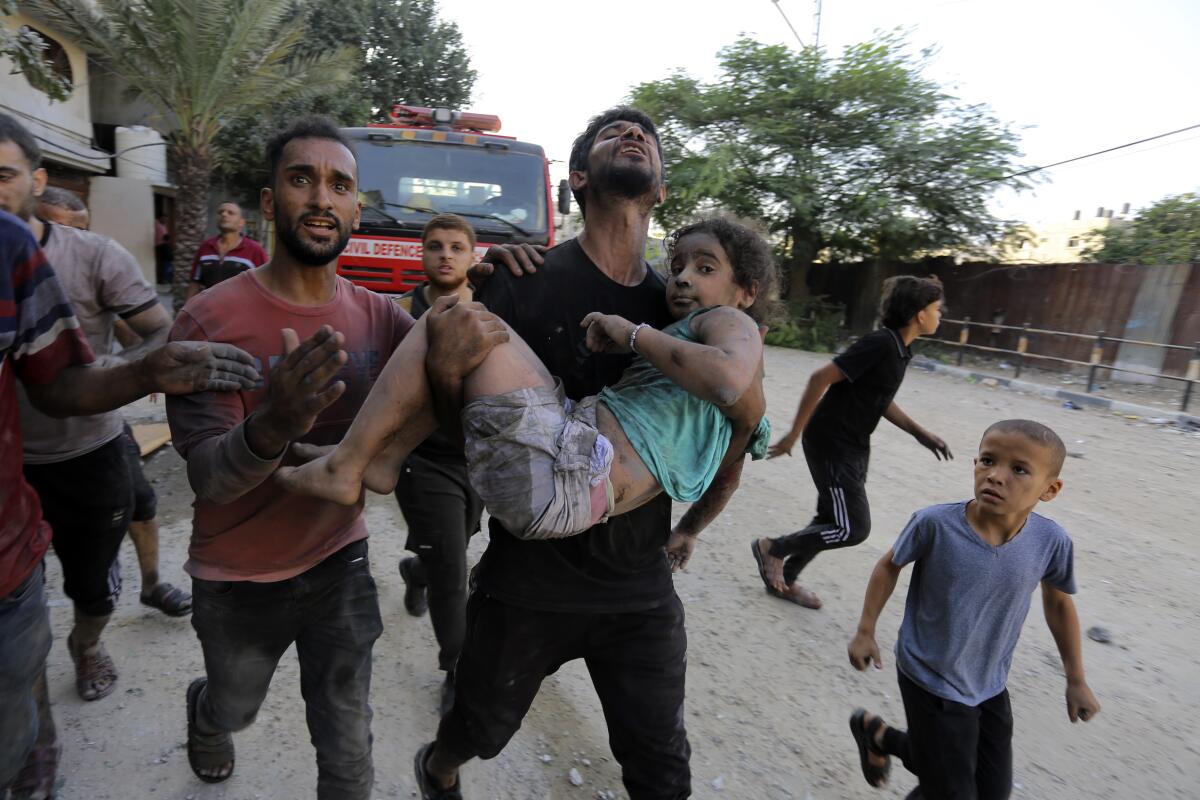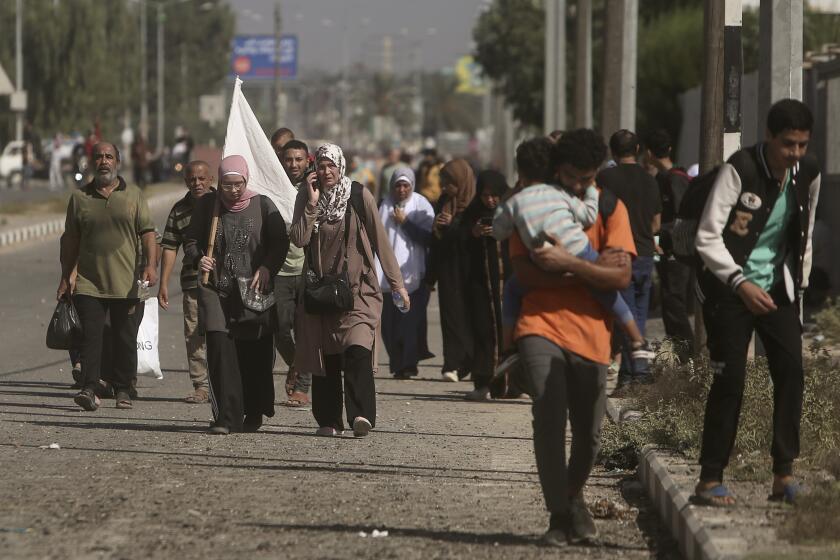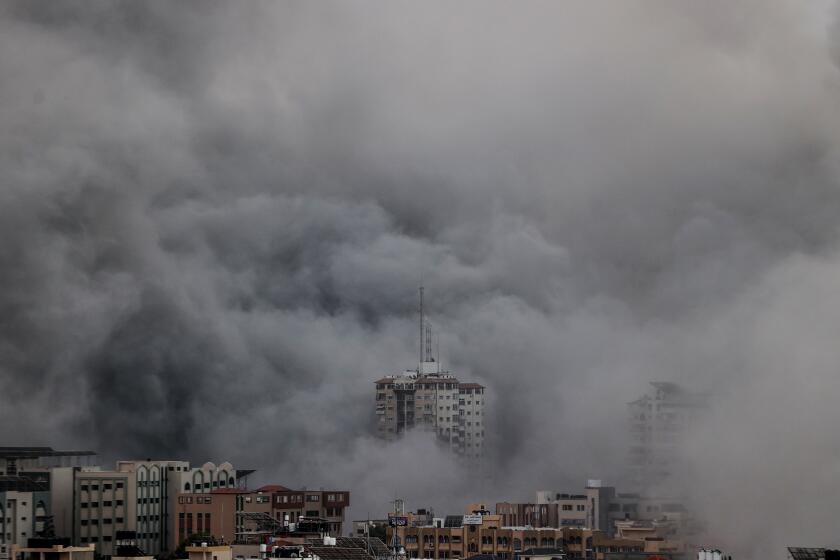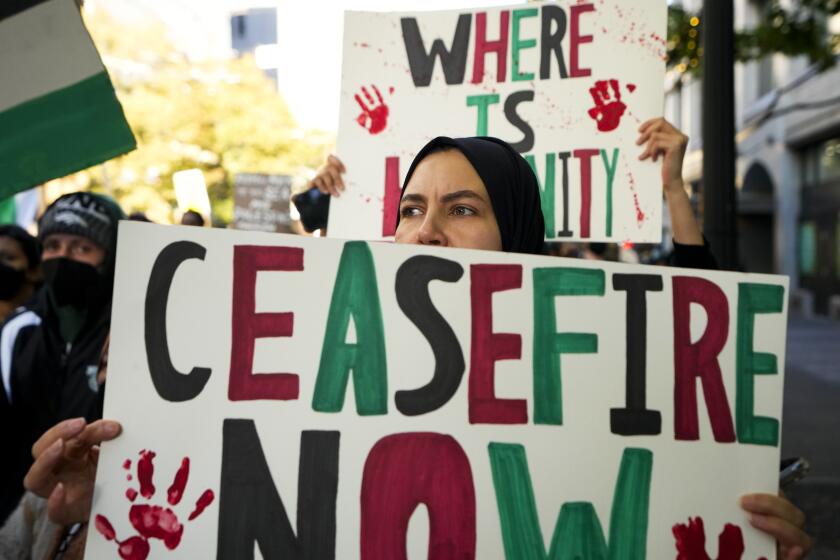Opinion: Gaza’s health system has collapsed, multiplying the war’s toll on children

- Share via
As the head of a humanitarian organization, I have been working for more than 30 years both to save the lives of injured children in Gaza and to help establish a modern healthcare system for specialized pediatric care in Gaza. That dream has been shattered. The lives of more than 5,000 children killed or missing in Gaza over the past month necessitate a redirection of our resources and efforts back toward the most basic measures to save children’s lives.
This journey helping Gaza children began in 1991 when I brought the first injured child from Gaza to the Shriners hospital in Los Angeles for prosthetic care after he suffered triple amputation from a bomb blast. Since then, we founded a humanitarian nonprofit to help bring hundreds of injured and ill children to the United States from Gaza for free care. The need has only grown.
Some respite may be in the works, but pauses in violence need to be long and frequent enough to deliver meaningful assistance to civilians in Gaza.
Last week, two brothers we sent in 2017 to Shreveport, La., for craniofacial surgery were killed along with others in their family by an Israeli airstrike on their home in Khan Yunis in southern Gaza, according to a video posted by their sister. Farid and Qossay Sallout are now among the more than 5,000 dead and missing children in Gaza since Oct. 7.
As we expanded after 1991, we sent thousands of international volunteer doctors and nurses on medical missions to Gaza, providing specialized surgeries for tens of thousands of children. In 2019, we achieved a significant milestone by establishing Gaza’s inaugural pediatric oncology department. At one time every child with cancer had had to travel outside Gaza for care, but the majority were then being treated for this terrible disease in our new department.
The Palestinian coders and techies I worked with built bridges to Silicon Valley. Amid Israel’s bombing, their vision of a new future for Gaza is crushed.
As we focused on improving the health sector’s specialized care of children, we have assessed the needs of Gaza’s hospitals to design programs and initiatives to enhance patient care and reduce the need for external referrals.
All this now is destroyed as the health system collapses and the humanitarian crisis deepens. Since Oct. 21, the influx of a few hundred aid trucks from Egypt has fallen drastically short of the 1,200 daily shipments needed to meet the basic necessities of Gaza’s 2.2 million inhabitants. The absence of fuel within these aid deliveries devastates the deteriorating health infrastructure. Gaza’s remaining hospitals rely on generators; since the electrical grid shut down almost a month ago, 14 of the region’s 35 inpatient hospitals have closed, as have 64% of primary care facilities across Gaza.
An expanded Palestinian government and PLO — including Hamas — must rule Gaza and the West Bank and negotiate to establish a Palestinian state.
The lack of fuel has far-reaching implications: Surgeons lack proper lighting to operate, anesthesiologists cannot administer anesthesia, intensivists can’t intubate critically injured patients, and neonatologists cannot provide critical care for premature infants. Additionally, nephrologists are unable to perform dialysis, and radiologists cannot conduct necessary X-rays for treatment planning, leaving thousands of civilians suffering from traumatic injuries daily. We had just completed a renovation of the operating theater in the Indonesian Hospital in Gaza, which is now closed because of the lack of fuel.
The scarcity of medications is another pressing concern. According to the World Health Organization, hospitals in the north are performing complex surgeries, including amputations, without anesthesia because of the shortage of medical supplies. Furthermore, hundreds of children with third-degree burns are being treated without appropriate dressings, receiving only acetaminophen for pain relief.
It’s not just injuries from the war that are inadequately addressed now. At Al-Rantisi Pediatric Specialized Hospital, where we established Gaza’s sole pediatric oncology department in 2019, children in remission from cancer are experiencing relapses because of shortages of essential drugs and treatments.
In addition to these challenges, our dedicated staff members have faced personal tragedies, with their homes destroyed and family members lost, compelling them to seek refuge in the south to escape escalating violence surrounding Rantisi. On Nov. 5, the hospital was bombed. On Friday, the Israel Defense Forces forced the evacuation of patients, their families, staff and the estimated 6,000 displaced people. But all hospitals in the south are beyond capacity and unable to accept even simple cases, let alone children with cancer.
With 1.5 million people displaced in Gaza and 40% of all housing structures damaged or destroyed, thousands, mostly children, seek shelter within overcrowded United Nations schools, leading to a surge in diseases. According to the U.N., deteriorating sanitation, lack of privacy and overcrowded conditions pose significant health and safety risks, resulting in a surge of acute respiratory infections, diarrhea, scabies and chickenpox among those seeking refuge.
The situations in northern and southern Gaza, for children and adults, are dire and deteriorating. Under these conditions, we can’t primarily focus on the sort of progress we saw in recent years such as providing advanced cancer care to children. And yet, much like the indomitable spirit of the people of Gaza, we remain steadfast in our commitment to aiding them in their journey toward recovery and rebuilding.
Although saving children’s lives must always be our first priority, Gaza’s collapsed health system will need to be rebuilt, again from the ashes of its once-proud hospitals, particularly in specialized pediatric care, which serves nearly half the population. The killing of thousands of innocent children over the past month has shown that my lifelong mission to serve Gaza’s children will truly last my lifetime.
Steve Sosebee is the president and founder of Palestine Children’s Relief Fund, a nonprofit based in Ohio and Ramallah in the West Bank.
More to Read
A cure for the common opinion
Get thought-provoking perspectives with our weekly newsletter.
You may occasionally receive promotional content from the Los Angeles Times.













